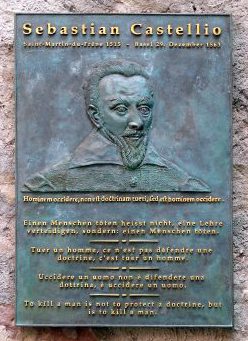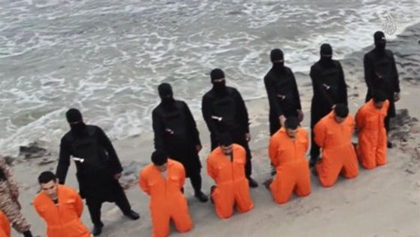It’s better to risk understating the extent and severity of persecution than to risk overstating the problem. What’s at stake is credible religious freedom advocacy.

Summary
A great number of Western Christians have laudably invested their time, money, and energy to confront the massive global challenge of religious persecution. Sadly, their effectiveness has too often been limited or undermined by several common mistakes. This paper explores seven of these pitfalls and points to Christian principles that enable us to more effectively advance religious freedom for all. My goal in pointing out these dangers is not to condemn any particular organisation or tactical approach, but rather to commend a more considered, capacious, and constructive promotion of religious freedom.
Introduction
While out for a walk on a recent visit to Basel, Switzerland I happened across a memorial plaque to the sixteenth-century French Protestant theologian Sebastian Castellio. Etched on the plaque I saw Castellio’s famously succinct denunciation of religious persecution: ‘to kill a man is not to protect a doctrine, but is to kill a man.’[1]
I sat down on a bench next to the memorial to reflect on Castellio’s life and legacy. In many ways he had a tragic existence. He had a falling out with John Calvin and lost his position as Rector of the College of Geneva. Despite being one of Europe’s most promising intellectuals, Castellio was at times reduced to dire poverty, even resorting to begging to feed his family. For his defence of toleration he was slandered by his critics and censored by municipal authorities. After he died in Basel, his enemies exhumed and burned his body and scattered his ashes so as to leave no trace of him. Even in death he was persecuted!
His body may have been destroyed but Castellio’s ideas – principally his plea for toleration and limited government – lived on and have largely won the day. His once controversial claim that civil authorities should not punish persons with dissenting theological beliefs is now more or less taken for granted throughout the West. As if to underscore the long-term victory of Castellio’s commitment to religious tolerance and freedom in Europe, his memorial plaque faces an old Protestant church which today is leased to the Serbian Orthodox community in Basel.
But when we consider ongoing religious persecution outside the community of liberal democracies – and the rise, within the West, of both right-wing populism that stigmatises ethno-religious minorities and of left-wing ideologies that ‘phobiaise’ traditional beliefs – we are reminded that we still have much progress to make before we live in a world in which Castellio’s vision is fully actualised.
 Commemorative plaque in Basel. / Photo: EinDao, CC-BY-SA-4.0)
Commemorative plaque in Basel. / Photo: EinDao, CC-BY-SA-4.0)We can see Castellio as a Christian model of how to continue the fight for religious freedom. Castellio lived and wrote in a socio-political context far removed from ours. Our contemporary challenge is not the treatment of Christian heretics but rather how to live peaceably amid a great diversity of ethnicities, nationalities, ideologies, and moralities. And yet, in Castellio we find many timeless arguments and principles we can apply to Christian efforts to advance pluralism and respect.
We see these manifest in Castellio’s best known work, Concerning Heretics, Whether They Are to Be Persecuted, published in response to the execution of antitrinitarian Michael Servetus in Geneva. Appealing to Scripture, Christian tradition, reason, and experience, Castellio demonstrates that protecting conscience from coercion is a moral duty and practical good. He engages with scores of biblical passages and theological texts to build a case that persecuting heretics is incompatible with the example and teaching of Christ, who is the fulfilment of Old Testament law. He notes wryly that Jesus himself was unjustly killed as a heretic.
And it’s not just Christian heretics who deserve freedom. Castellio argues that respect for the freedom of Jews and Muslims is a logical extension of New Testament ethics, particularly Paul’s admonition in Romans 14 to ‘not treat with contempt’ those whose consciences lead them to divergent beliefs and practices. Castellio’s magnanimity is worthy of emulation in our day. While it’s easy to advocate for the rights of one’s own community, it’s much harder to promote toleration for groups that are widely feared or reviled and viewed as political enemies or religious rivals.
Castellio was convinced that coercing religious conformity does not engender social harmony. ‘A careful investigation will,’ he argued, ‘reveal that persecutors have always been the cause of great troubles.’[2] Castellio cites the example of religiously diverse Constantinople, where the three Abrahamic faiths ‘live in peace, which certainly they could not do if there were persecution.’[3]
Fortunately, there are many twenty-first-century champions of religious freedom and other human rights who carry on Castellio’s legacy of learned, magnanimous, biblically and theologically grounded advocacy. Unfortunately, there are far too many examples of Christians falling far short of Castellio’s model. They agitate for freedom in ineffective or even counterproductive ways. In my years of working on belief rights, first as a diplomat in the US State Department’s Office of International Religious Freedom and now as the director of a research centre on religion and international studies at the University of Cambridge, I have seen numerous examples of how not to combat persecution.
In this paper I will explore seven of the most common and problematic pitfalls in combatting persecution. My goal in pointing out these dangers is not to condemn any particular organisation or tactical approach, but rather to commend a more considered, capacious, and constructive promotion of religious freedom. I want to see Christians working more effectively towards a world in which no one is killed – or in any way mistreated or deprivileged – on account of their beliefs.
Pitfall 1: Ignoring the problem of persecution
Even as I highlight several pitfalls that I’ve seen Christians stumble into when attempting to combat persecution, it needs to be acknowledged at the outset that ignoring – or being ignorant of – the problem is still a major issue. Among Christians, wilful inaction may stem from a millenarian view that persecution is a harbinger of the eschaton and thus cannot be stopped, or the belief that because persecution can be spiritually enriching it should not be stopped.[4] Whatever the reason, the single greatest pitfall to avoid is doing nothing at all.
In their recent co-edited volume Under Caesar’s Sword, Dan Philpott and Tim Shah observe,
The vast majority of the world’s Christians… have little direct experience of the intense religious repression that increasingly engulfs their fellow Christians. This experiential gap helps to explain the West’s attention deficit vis-a-vis the massive global challenge of religious persecution in general and Christian persecution in particular.
To counteract this attention deficit, we must take seriously the New Testament teaching on the local and global church as one spiritual body. As Paul writes in 1 Corinthians 12:26 ‘If one part suffers, every part suffers with it.’ Several of my friends in Washington, DC have recently started a charity simply called OneBody to ‘organise prayer gatherings for the persecuted church,’[5] and many other Christian efforts around the world emphasise our membership in one body. These saints are to be commended.
However, I do want to offer two words of caution here. First, Western Christians must avoid thinking of themselves as noble liberators of their benighted brethren. Combatting persecution is not some latter-day white man’s burden. Every nation struggles to some degree to accommodate its religious diversity, and principled accommodations only become possible and sustainable when they are embraced from within each nation. That said, those of us who are Western Christians should recognise that we have opportunities to humbly and carefully steward our relative wealth and power to resource and reinforce indigenous reform efforts.
Second, Christians should be careful not to give the impression that every congregation or individual Christian must make combatting persecution (or any other worthwhile cause) their top priority – and they are spiritually deficient if they don’t. Again, we must consider the ‘body’ metaphor. In Romans 12:4 Paul says, ‘For as in one body we have many members, and the members do not all have the same function.’ (ESV)
 21 Coptic Christians were beheaded in Libya by the IS in 2015. / Video capture, EP
21 Coptic Christians were beheaded in Libya by the IS in 2015. / Video capture, EPPitfall 2: Exaggerating the problem
In a well-intentioned effort to alleviate this deficit of attention and to compel action, some religious freedom advocates exaggerate the problem or offer highly imprecise accounts that misrepresent the scale and severity of Christian persecution in a given context. One frequently hears descriptions such as ‘Christians in Country X are being beaten, imprisoned, and killed for their faith.’ Such statements are most often literally true at a certain level but they can give the impression that perhaps all Christians in that country are suffering that fate or are in imminent danger of suffering it. This sort of language does a better job of raising funds than relieving persecution.
Several organisations do try to measure the scale of persecution with quantitative precision, but these efforts can, if not handled with care, exacerbate the problem of exaggeration. For instance, the Pew Research Center in Washington, DC produces a highly-regarded study of global religious freedom conditions that finds, in its most recent report, that 83 per cent of the world’s population lives in countries with high or very high religious restrictions. But if one doesn’t carefully examine Pew’s definitions, methodology, and narrative caveats, one can come away with the impression that the vast majority of the globe faces active persecution.[6]
In 2018 I had the privilege of working with an international team of researchers on the European Parliament’s annual report on freedom of religion or belief.[7] My key takeaway from that exercise is just how difficult it is to measure the enormously complex and contested phenomenon of religious persecution and intolerance. Numbers can obfuscate as much as they clarify. Given this difficulty, I argue for erring on the side of modesty and caution. It’s better to risk understating the extent and severity of persecution than to risk overstating the problem. What’s at stake is credible religious freedom advocacy. Abusive regimes fear public scrutiny and look for any opportunity to undermine an advocate’s credibility. In a world awash with fake news and misinformation, Christians must be people of truth and integrity. As we are reminded in Proverbs 16:11, ‘Honest scales and balances belong to the Lord.’
Judd Bridsall, Managing Director of the Cambridge Institute on Religion & International Studies.
This paper first appeared on the Jubilee Centre website and was re-published with permission.
NOTES
[1] The quote is taken from Castellio’s Contra Libellum Calvini, fol. E1v.
[2] Roland H Bainton, trans. Concerning Heretics, Columbia University Press, 1935, p.225.
[3] Ibid.
[4] It’s important to note here that the Bible contains no generalised affirmation of religious freedom nor any explicit call to combat religious persecution. As Timothy Shah observes, ‘Even a cursory examination of the major New Testament [authors] demonstrates that not only did these apostles possess little inclination to argue against persecution, but they showed a strong tendency to accept and embrace it as integral to God’s redemptive purposes.’ However, as the two volumes of Christianity and Freedom, co-edited by Shah, attest, further reflection on Scripture by subsequent generations of Christian led to the development of a robust account of religious freedom grounded in a biblical understanding of man, the church, and the government.
[5] See prayforonebody.org.
[6] For instance, Pew considers government funding for faith-based schools, mandatory religious education in public schools, and state support for the maintenance of religious property to be ‘restrictions’ on freedom of religion. Pew does helpfully nuance the ‘83%’ finding in its report narrative, but I fear what sticks in people’s minds is the alarming statistic and not the descriptive caveat.
[7] To read a full account of our research methodology and results, read the ‘Annual Report 2017 Annex’ at www.religiousfreedom.eu/wp-content/uploads/2018/09/RS_Annex_v1_forprint_withbleed.pdf

Las opiniones vertidas por nuestros colaboradores se realizan a nivel personal, pudiendo coincidir o no con la postura de la dirección de Protestante Digital.
Si quieres comentar o